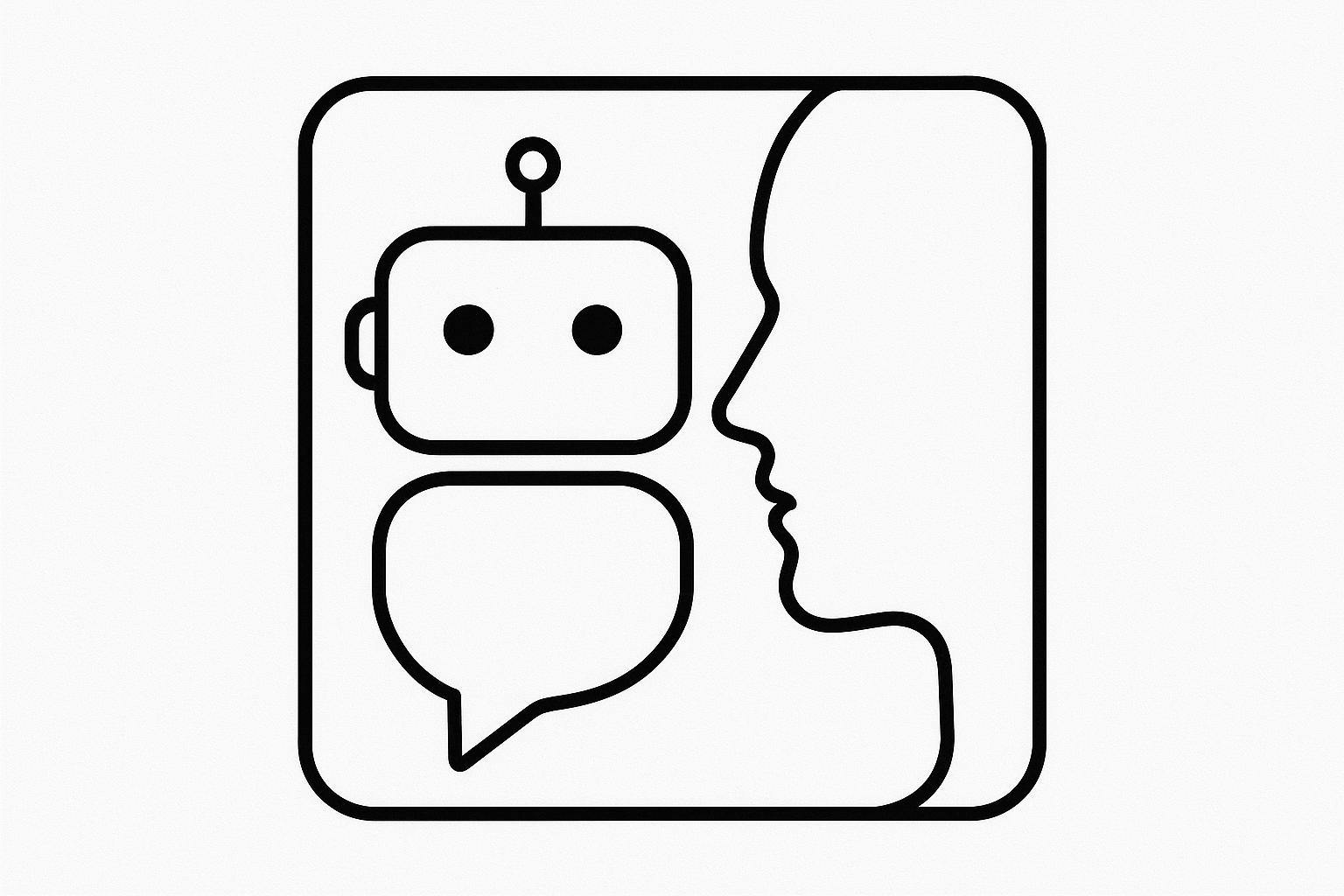
Want to streamline customer support without coding? These 7 no-code AI live chat tools make it simple to automate responses, escalate complex queries, and integrate with popular platforms. Here's a quick rundown:
Quick Comparison:
| Tool | Starting Price | Key Features | Best For |
|---|---|---|---|
| Tidio | $29/month | E-commerce integrations, AI chatbots | Online stores |
| HubSpot Chatbot | Free ($45/month) | CRM integration, lead generation | Sales-focused teams |
| ChatGPT | $20/month (basic) | Advanced AI, API access | Flexible AI for businesses |
| HuggingChat | Free | Open-source, customizable | Privacy-conscious startups |
| OpenDialog | Custom pricing | Complex dialogue management | Large enterprises |
| Help Scout | $20/month/user | Unified inbox, proactive messaging | Customer support teams |
| God of Prompt | $0–$150 (one-time) | AI prompt library, lifetime updates | AI response optimization |
These tools cater to various needs - whether you're scaling an e-commerce store, managing enterprise-level interactions, or refining AI-driven responses. Choose based on your business size, budget, and goals.
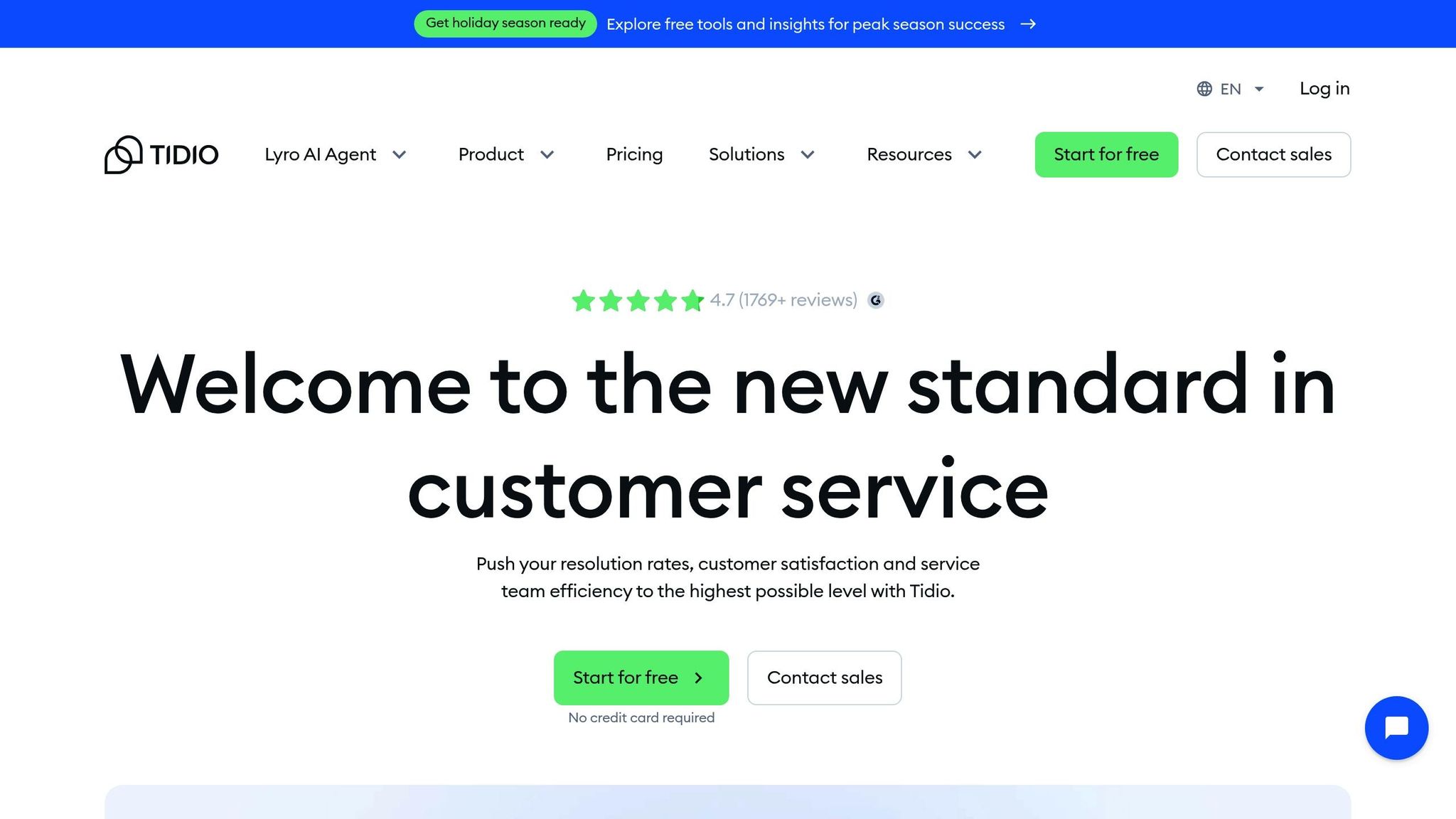
Tidio is a no-code live chat solution powered by AI, designed to handle routine customer inquiries while escalating more complex issues to human agents. It combines simplicity with advanced automation, making it a versatile tool for businesses looking to streamline customer support.
Tidio works effortlessly with a wide range of platforms, making it easy to integrate into your existing systems. It supports major e-commerce platforms like Shopify, CRM tools, and marketing platforms through plugins, APIs, and other integrations. For Shopify users, Tidio can manage orders, preview customer carts, and even suggest products - all directly from the inbox.
Adding Tidio to your website is straightforward: you can use a JavaScript snippet for HTML sites or dedicated plugins for CMS platforms. Premium users benefit from expert assistance for custom integrations, and the platform also offers an OpenAPI for businesses needing more tailored solutions.
Tidio’s pricing structure is designed to accommodate businesses of various sizes. The Premium plan unlocks advanced integration features and includes dedicated support for setting up custom app integrations, making it ideal for companies that rely heavily on third-party tools.
Tidio allows you to tailor the chat widget to match your brand. Through the Settings > Live Chat > Appearance section, you can adjust colors, add your logo (available for Plus subscribers), change the widget’s position, and create personalized welcome messages. You can also set up pre-chat surveys to gather visitor information, ensuring compliance with GDPR preferences.
The platform supports up to five conversation starter prompts and allows custom background images for both desktop and mobile versions. Additionally, you can control visibility by hiding the chat widget on specific pages or for visitors from certain regions.
Tidio grows with your business by offering advanced AI automation and smart department routing. Even when your team is offline, the chat widget remains active, ensuring customers can still engage. For Plus subscribers, conversations are automatically directed to the right teams based on department selection. Tidio’s seamless integration with multiple CRM and marketing tools ensures smooth data flow, helping your business stay organized and efficient as it expands.
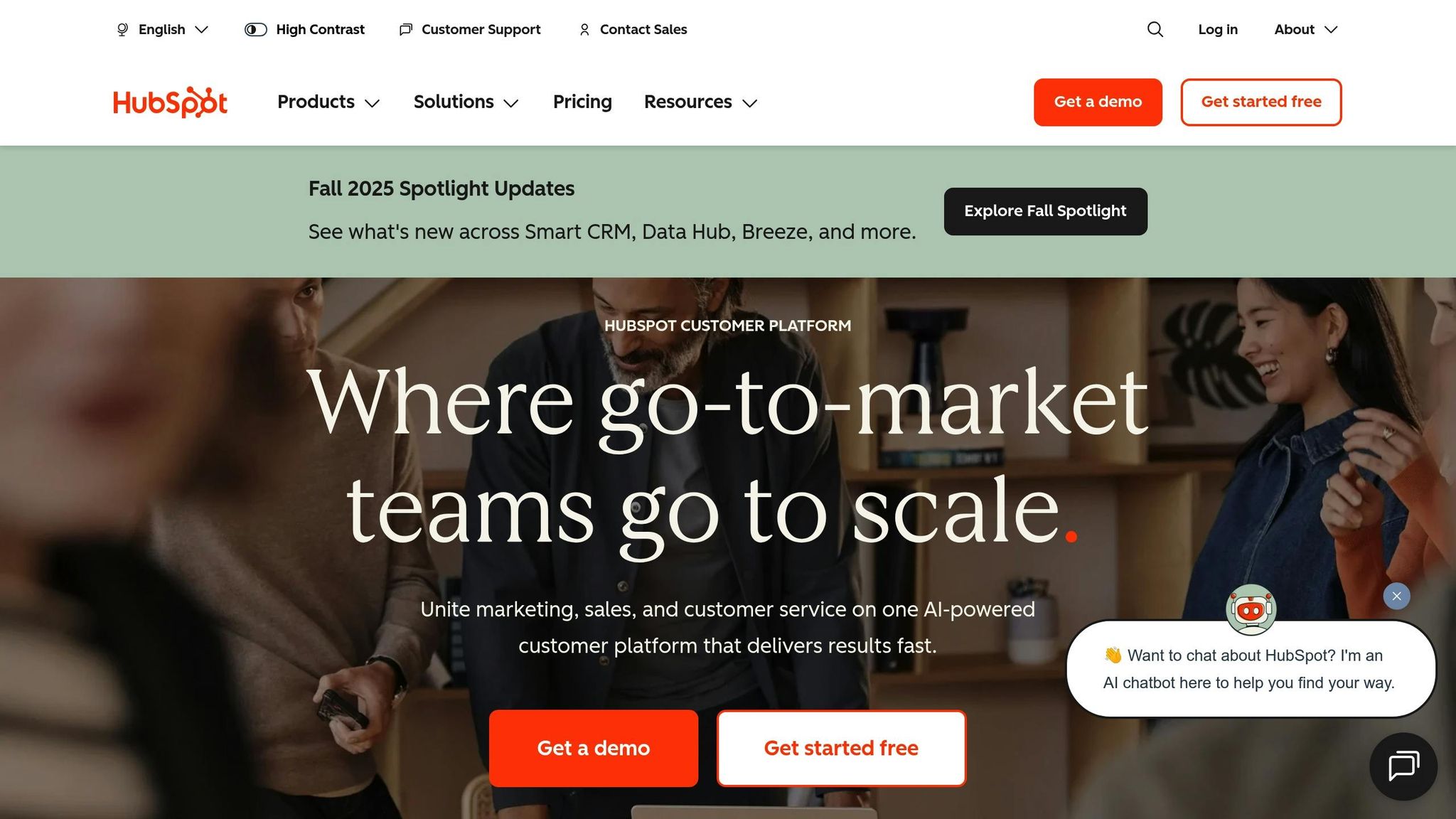
HubSpot Chatbot, much like Tidio, simplifies customer support with its user-friendly, no-code automation. It allows businesses to personalize live chat experiences without requiring any technical expertise.
HubSpot provides three types of chatflows to suit different needs:
You can easily adjust the live chat setup to align with your specific interaction goals.
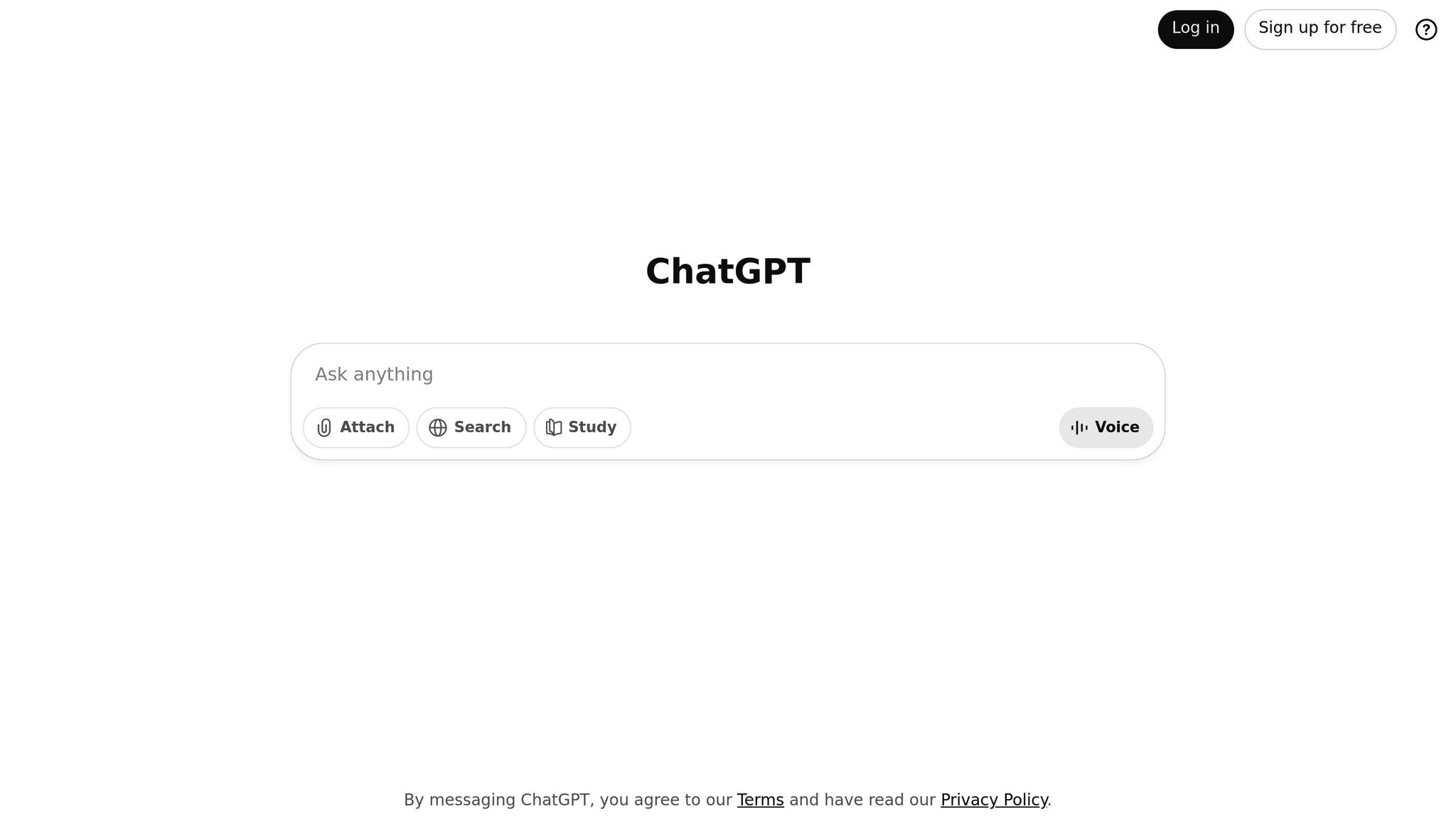
ChatGPT is a live chat tool designed to provide natural, context-aware responses. Unlike traditional chatbots, it leverages advanced natural language processing to deliver replies that feel conversational and human-like.
This tool is particularly effective for businesses managing complex customer queries. Whether it's technical support, product recommendations, or educational content, ChatGPT offers detailed, intuitive responses that enhance customer experiences.
ChatGPT is built with flexibility in mind, offering integration through OpenAI's API. Even businesses without coding expertise can easily connect it to platforms like WordPress, Shopify, and Wix using plugins or third-party tools.
For those using no-code platforms, ChatGPT can be embedded directly into websites. Tools like Zapier and Make.com make it simple to integrate ChatGPT into existing workflows, enabling features like automated conversation routing and CRM chat transcript storage.
Customization is another standout feature. With custom instructions and system prompts, you can fine-tune ChatGPT's responses to align with your brand's tone and business needs. This ensures a seamless and consistent customer experience across all interactions, making it a cost-efficient solution for businesses of all sizes.
ChatGPT uses a pay-per-use model, with pricing based on OpenAI's API structure. Costs depend on the model:
For moderate usage, monthly expenses typically range from $20 to $200. Larger enterprises with higher usage might spend between $500 and $2,000 monthly. Despite these costs, the tool often pays for itself by improving customer satisfaction and reducing the workload on support teams.
ChatGPT is designed to scale effortlessly, making it suitable for startups and large enterprises alike. It can handle thousands of simultaneous conversations without compromising performance.
The platform's rate limiting feature ensures smooth operation, even during peak traffic. For businesses requiring higher capacity, OpenAI offers increased rate limits, supporting organizations that process over a million API calls each month.
Another key feature is ChatGPT's conversation memory within individual sessions, enabling it to understand and respond to follow-up questions with context. However, session data doesn't carry over between chats unless additional storage solutions are implemented during integration. This flexibility makes it a powerful tool for businesses aiming to deliver meaningful, efficient customer interactions.
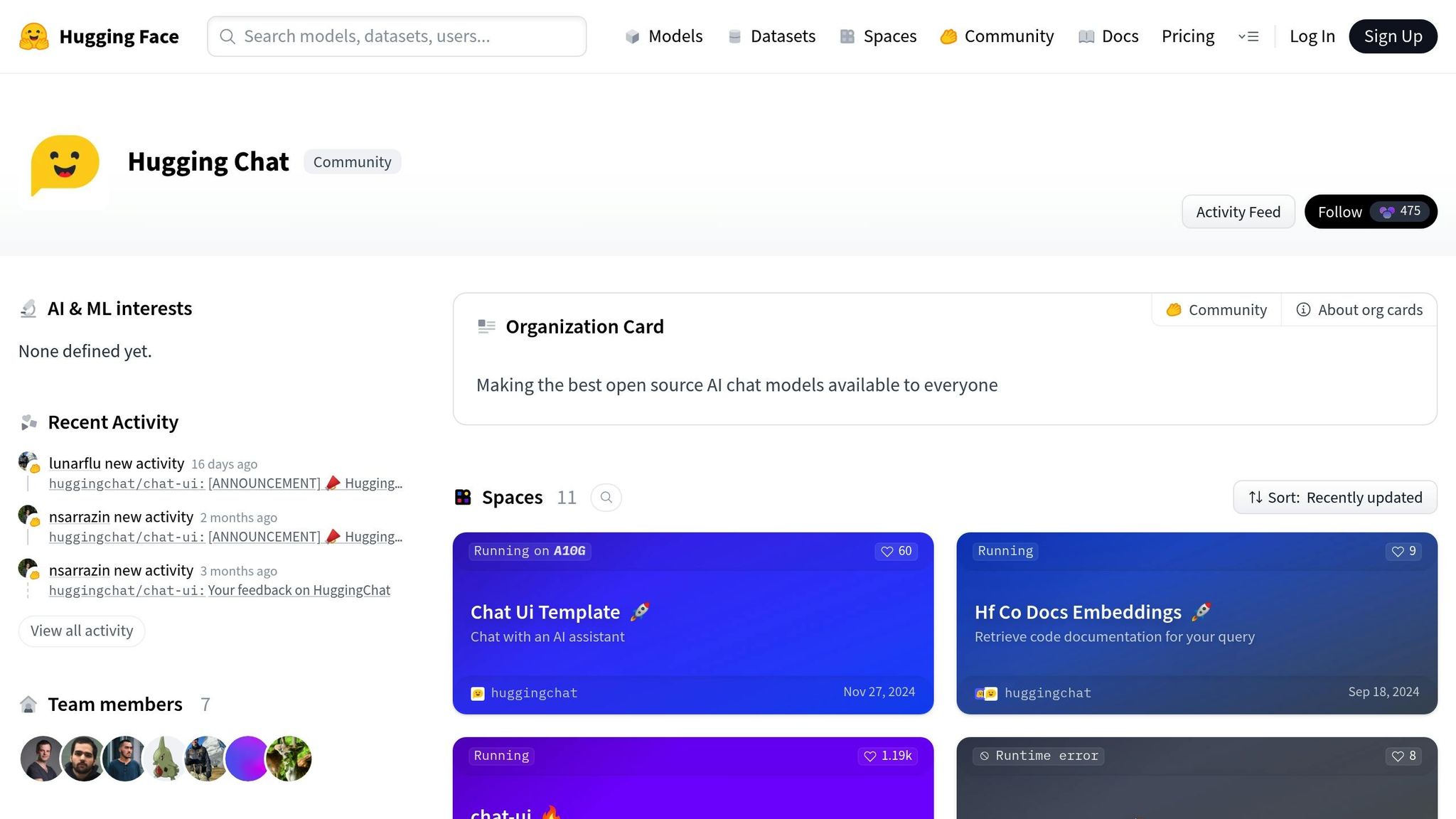
HuggingChat stands out as a free, open-source tool for creating live chat solutions. Built on Hugging Face's robust library of AI models, it gives businesses access to a variety of conversational AI options without the burden of licensing fees. This makes it an attractive choice, especially for startups and smaller businesses looking for effective AI-driven chat capabilities on a budget.
HuggingChat provides its core chat interface at no cost. While the basic offering is free, businesses may encounter small fees for hosting or higher performance limits. If you require advanced data storage services, there might be additional charges, but these costs are typically manageable for small to medium-sized businesses.
One of HuggingChat's key strengths is its flexibility. You can fully customize the chat interface, swap out AI models, and fine-tune responses to better fit your business needs. Its open-source nature also allows seamless integration with other tools and services, enabling businesses to design a chat experience that complements their workflows and enhances customer service efforts.
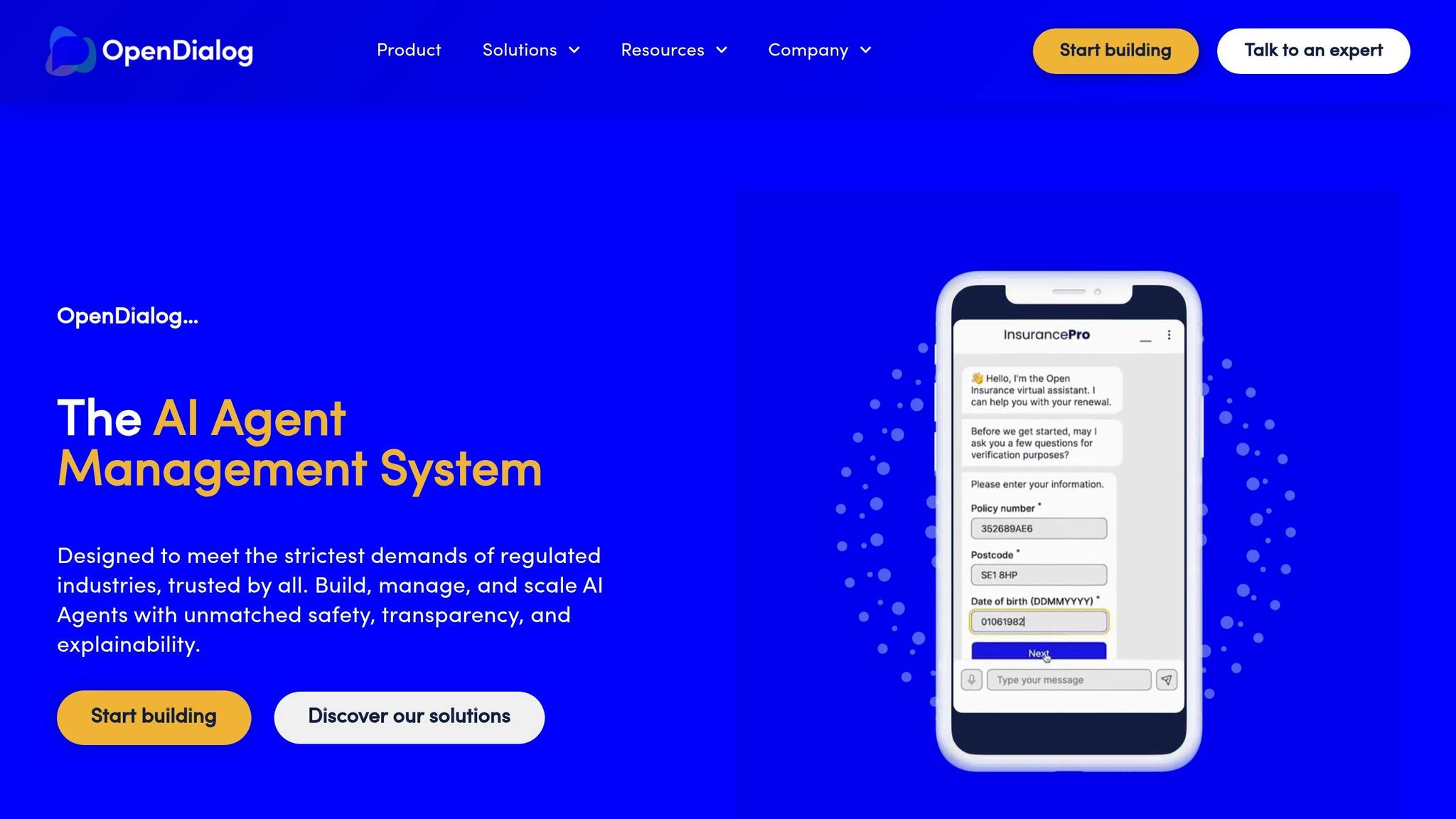
OpenDialog stands out as a powerful enterprise-grade platform tailored for handling complex, multi-turn customer interactions. Positioned as an alternative to tools like ChatGPT and HuggingChat, it combines the simplicity of no-code interfaces with the sophistication of advanced AI. This makes it especially appealing for businesses seeking to build chatbots capable of managing intricate conversations while remaining user-friendly for non-technical teams. OpenDialog prioritizes natural language understanding and multi-turn dialogue, delivering a conversational experience that feels more human.
OpenDialog connects effortlessly with a variety of tools and platforms. It integrates with CRM systems, help desk software, e-commerce platforms, and major messaging channels like websites, Facebook Messenger, WhatsApp Business, and Slack. These integrations are supported by pre-built connectors and an API-first design, ensuring flexibility. Additionally, the platform offers analytics to generate actionable insights from user interactions.
The platform uses a subscription-based pricing structure to cater to businesses of all sizes. For smaller businesses, there’s an entry-level plan that includes essential integration features. Mid-tier plans offer increased conversation limits and more advanced customization options. For large enterprises, tailored solutions are available, with pricing customized to meet specific operational needs.
OpenDialog offers a visual conversation designer that simplifies the creation of complex dialogue flows - no coding required. Users can personalize response templates, conversation logic, and integration workflows, as well as adjust the appearance of chat widgets. For those with technical expertise, custom code can also be added. The platform supports multilingual capabilities, making it suitable for businesses with diverse customer bases.
Built on a scalable cloud infrastructure, OpenDialog automatically adjusts to handle spikes in traffic, using load balancing and redundancy to ensure reliability. It supports business growth through features like role-based access controls and collaborative design tools. As conversation volumes grow, its analytics dashboard evolves, providing deeper insights to help businesses refine their chatbot strategies.
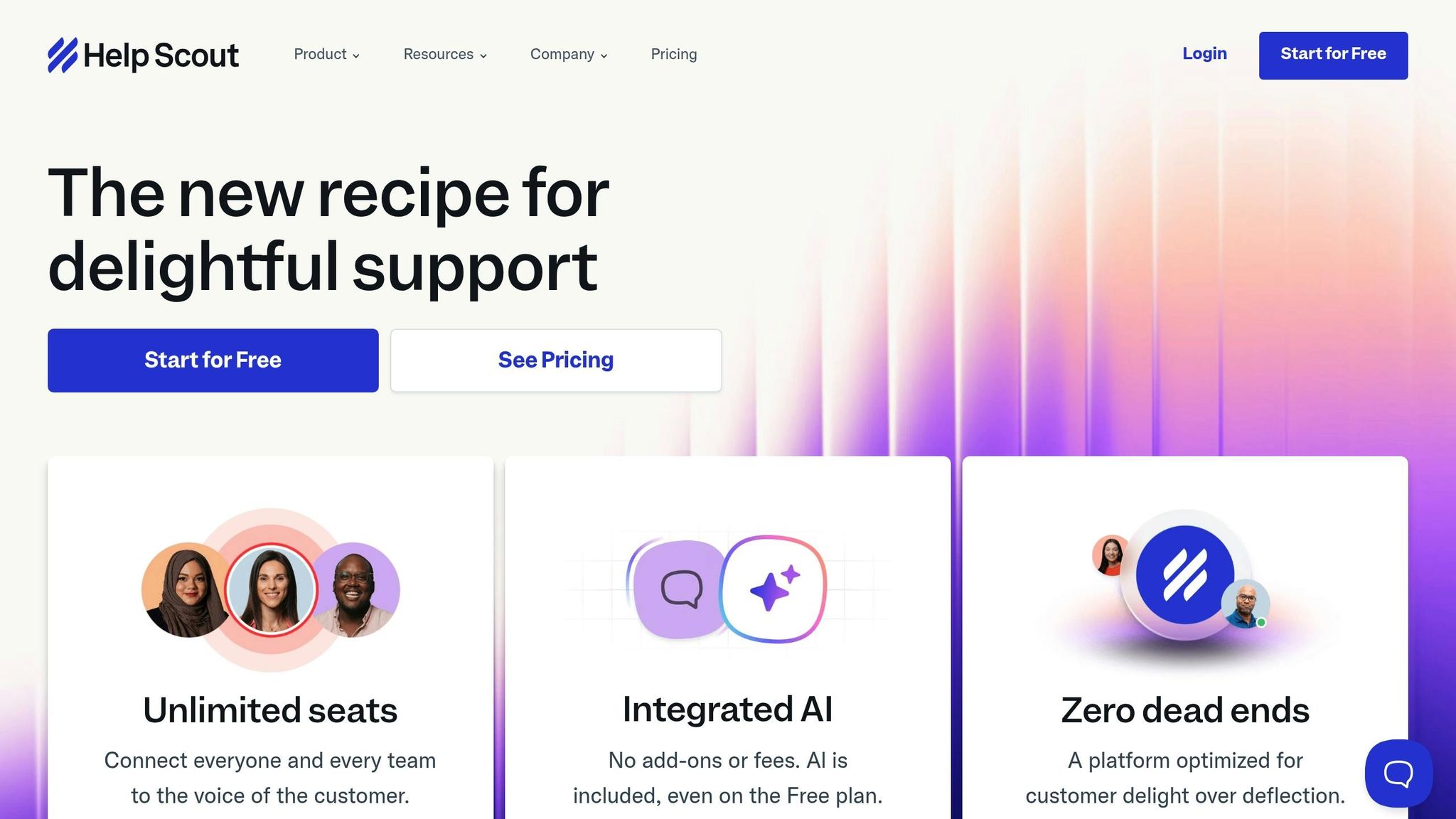
Help Scout offers Beacon - a versatile support hub that brings live chat directly to your website. What sets it apart is how it consolidates all customer interactions into a single, easy-to-manage inbox. This approach simplifies customer service while keeping it personal and efficient.
Beacon isn't just about live chat; it also integrates AI-powered answers from your knowledge base, making it a well-rounded tool for businesses looking to streamline support across multiple channels.
Help Scout's design makes it easy to connect with other live chat tools, boosting its overall functionality. For instance:
The platform also supports integrations with tools like Olark, SnapEngage, and Userlike. Through Zapier, Help Scout can connect to over 50 additional apps. For developers, the Help Scout API offers even more customization options.
Help Scout's pricing is based on the number of customers assisted, not the number of agents. This contact-based model ensures you only pay for the customers you engage with, helping businesses manage costs effectively. A "contact" is defined as any customer who receives a reply, with multiple interactions from the same customer counted as one. The trailing three-month average determines your monthly bill, offering predictability.
Help Scout is built to grow with your business. Its contact-based pricing model means you only pay for the customers you assist, making it cost-effective for scaling operations. By unifying live chat, email, and social media into one inbox, it simplifies support as your customer base expands. Plus, the Fair Billing Policy ensures that seasonal spikes in contact volume won't lead to unexpected charges, offering peace of mind for businesses navigating fluctuations.
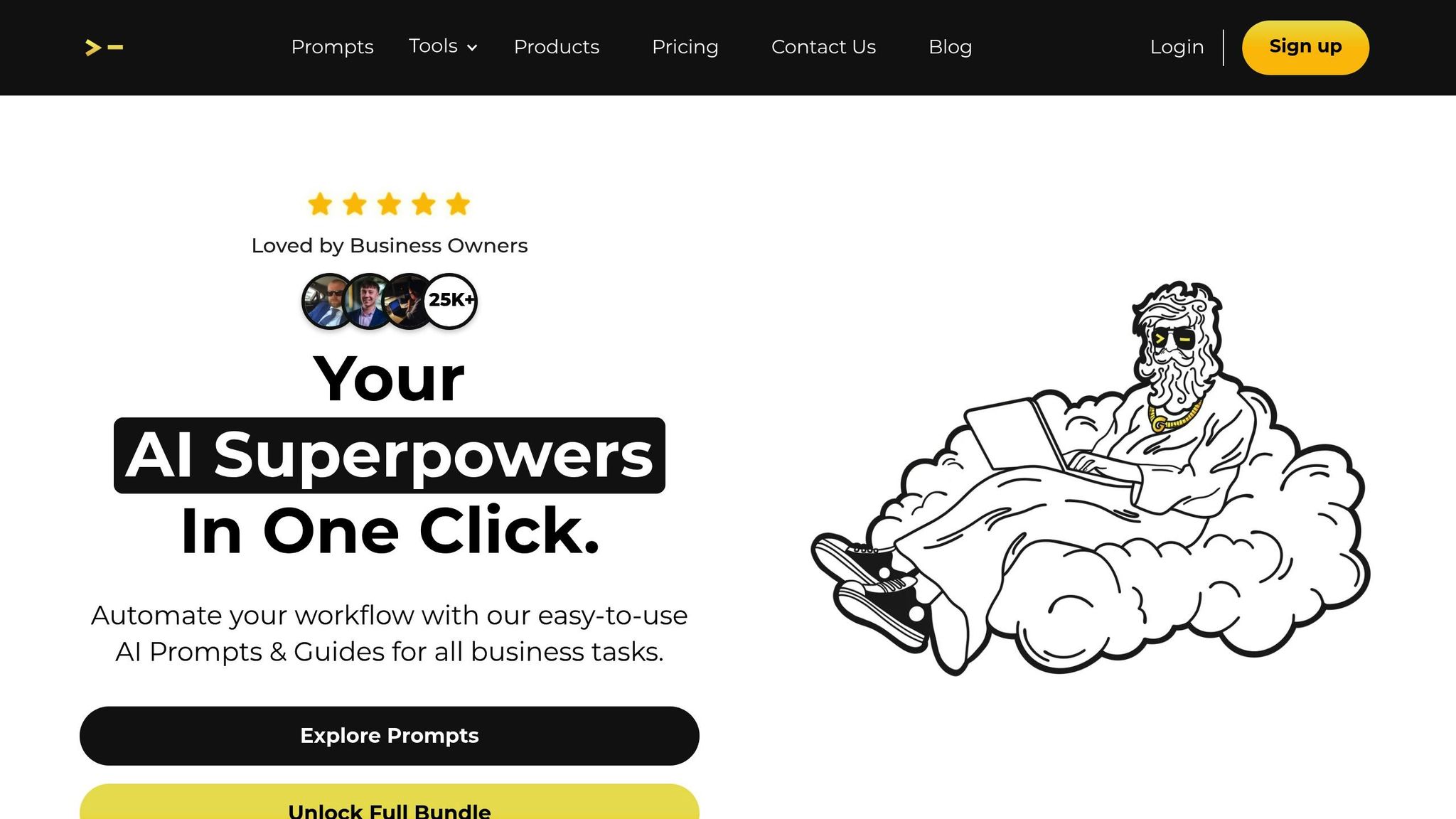
As live chat platforms continue to advance, tools like God of Prompt provide a powerful way to optimize AI-driven responses. This platform specializes in AI prompt engineering, helping businesses create automated, on-brand interactions. With a massive library of over 30,000 AI prompts tailored for ChatGPT, Claude, Midjourney, and Gemini AI, it simplifies the process of crafting chatbot responses and automating customer interactions - no coding required.
God of Prompt equips businesses with the tools to deliver seamless and engaging live chat experiences. Whether you're looking to automate responses for frequently asked questions or design personalized conversations that reflect your brand's tone, this platform has the resources to make it happen.
While God of Prompt isn’t a live chat platform itself, it integrates easily with popular AI models, offering pre-built conversation templates that enhance customer service efficiency. Its focus lies in creating precise, ready-to-use prompts that can be customized for specific business needs.
The platform provides its resources via Notion, making it simple to organize and adapt prompts alongside other operational tools. This centralized setup streamlines customer service workflows. Additionally, its custom GPTs toolkit enables businesses to develop specialized chatbots tailored to their industry, complementing existing live chat systems that support AI-powered responses.
God of Prompt offers flexible pricing plans to suit different business sizes and needs:
| Plan | Price | Key Features | Best For |
|---|---|---|---|
| Free | $0 | 1,000+ ChatGPT prompts, 100+ Midjourney prompts, 10 Mega-Prompts | Small businesses testing AI chat |
| Writing Pack | $37 | 200+ writing-focused Mega-Prompts, guides | Content-heavy customer support |
| ChatGPT Bundle | $97 | 2,000+ Mega-Prompts, all premium prompts | Chat automation |
| Complete AI Bundle | $150 | 30,000+ prompts, unlimited custom prompts | Enterprise-level implementations |
All plans include lifetime updates and a 7-day money-back guarantee, allowing businesses to explore the platform risk-free.
One of the standout features of God of Prompt is its ability to deliver unlimited custom prompts through the Complete AI Bundle. This option allows businesses to design highly specific conversation flows that align with their brand voice and customer service goals.
The platform also provides prompt engineering guides with step-by-step instructions, making it easy for teams to create tailored responses. Categorized prompt bundles cover areas like marketing, SEO, productivity, and customer service, offering pre-designed templates that can be adapted to unique requirements. This approach not only saves time but also ensures that AI-powered chat enhancements are implemented effectively and scale with ease.
God of Prompt is designed to grow with your business. With lifetime updates, your prompts stay relevant as AI technology evolves, ensuring your investment remains effective. The extensive library of over 30,000 prompts supports scaling customer service operations without requiring additional technical expertise.
Its no-code approach makes it accessible for teams of any size. By using the provided prompts and guides, businesses can quickly implement advanced conversation flows without needing specialized developers. Plus, with compatibility across multiple AI engines - ChatGPT, Claude, Midjourney, and Gemini AI - the platform offers the flexibility to adapt to your evolving needs.
Selecting the right no-code AI tool for live chat depends on your business goals, budget, and technical needs. Below is a comparison chart highlighting the key features, pricing, and capabilities of various platforms to help you decide which one suits your requirements.
| Tool | Starting Price | Key Features | Integration Options | Best For | Scalability |
|---|---|---|---|---|---|
| Tidio | $29/month | AI chatbots, live chat, email marketing automation | WordPress, Shopify, Wix, custom APIs | E-commerce businesses | High - handles unlimited conversations |
| HubSpot Chatbot | Free (Premium $45/month) | CRM integration, lead qualification, meeting scheduling | Native HubSpot CRM, Salesforce, third-party tools | Sales-focused teams | Enterprise-level scaling |
| ChatGPT (OpenAI) | $20/month per user | Advanced conversational AI, custom instructions, API access | API integration with any platform | Businesses needing flexible AI | Unlimited with API usage |
| HuggingChat | Free | Open-source models, privacy-focused, customizable | Self-hosted options, API integrations | Privacy-conscious organizations | Medium - depends on hosting |
| OpenDialog | Custom pricing | Conversation management, multi-channel support | Custom integrations, enterprise APIs | Large enterprises | Enterprise-grade scaling |
| Help Scout | $20/month per user | Shared inbox, knowledge base, customer profiles | 100+ integrations including Slack, Salesforce | Customer support teams | High - grows with team size |
| God of Prompt | Free to $150 one-time | 30,000+ AI prompts, custom prompt creation, lifetime updates | ChatGPT, Claude, Midjourney, Gemini AI via Notion | Businesses optimizing AI responses | Unlimited prompt usage |
This chart helps clarify how each tool aligns with different business needs. For those prioritizing cost, HuggingChat offers a budget-friendly option, while God of Prompt shines with its one-time payment model and lifetime updates.
Integration capabilities also vary. God of Prompt enhances existing AI tools and seamlessly works with multiple engines like ChatGPT and Claude. Meanwhile, enterprise-focused platforms like OpenDialog and HubSpot excel at managing high-volume conversations, and tools like Tidio and Help Scout are ideal for small to medium businesses seeking a balance of features and scalability.
When it comes to customization, God of Prompt stands out with its Complete AI Bundle, offering unlimited custom prompts to create tailored conversation flows. ChatGPT provides flexibility through API customization, while tools like Help Scout focus more on workflow adjustments rather than conversational AI.
Finally, consider the technical requirements. HuggingChat may require more technical expertise for setup, making it better suited for teams with advanced skills. On the other hand, platforms like Tidio and HubSpot are designed with user-friendly interfaces, catering to non-technical teams. God of Prompt strikes a balance by offering pre-built prompts that require no coding but deliver sophisticated AI-driven results. This breakdown helps businesses choose a tool that matches their current needs and future ambitions.
No-code AI tools for live chat are reshaping how businesses manage customer support. By removing the need for coding, these platforms deliver advanced conversational experiences that speed up response times and boost customer satisfaction.
Each tool caters to different business needs. For small to medium-sized businesses, Tidio and Help Scout simplify customer service workflows. HubSpot Chatbot is a solid choice for integrating chat with sales processes. If conversational adaptability is a priority, ChatGPT offers unmatched flexibility through API access, while HuggingChat is ideal for organizations prioritizing data privacy.
A standout option is God of Prompt, which enhances existing AI tools rather than replacing them. With over 30,000 prompts and lifetime updates for $150, it works across platforms like ChatGPT, Claude, and Gemini AI, making it an excellent choice for businesses already using advanced AI tools. This approach highlights the importance of tailoring AI strategies to specific needs.
When selecting a tool, consider your business size, technical expertise, budget, and growth plans. For example, startups might benefit from HubSpot's free tier and CRM integration, while enterprises could turn to OpenDialog for custom solutions. If you're already leveraging sophisticated AI, God of Prompt can elevate your existing systems without requiring a platform switch.
Opt for tools with clear pathways for growth. Platforms like Tidio and HubSpot offer scalable options, while God of Prompt ensures unlimited prompt usage, regardless of conversation volume. This adaptability ensures your investment continues to deliver value as your business evolves.
Choosing the right no-code AI live chat tool comes down to understanding your business's size, requirements, and budget. If you're a small business or startup, you’ll want to focus on tools that offer free plans or affordable pricing. Many of these start at around $16–$20 per month and typically cover essential features like live chat and basic automation.
For larger companies that require more advanced features, such as complex integrations and extensive customization, premium tools are available. These can range anywhere from $800 to over $10,000 per month, depending on the level of functionality and support offered.
When evaluating your options, think about scalability, user-friendliness, and how well each tool aligns with your business objectives. Striking the right balance between features and cost will help you choose a solution that fits your needs perfectly.
When picking a no-code AI live chat tool, focus on its integration capabilities to ensure it works smoothly with your current systems. A good tool should support API integrations, making it easy to connect with CRMs, helpdesk software, or other key business platforms. Compatibility with automation tools like Zapier is also a plus, as it can streamline workflows and save valuable time.
You’ll also want a tool that links with multiple AI models and third-party services. This kind of flexibility ensures the tool can grow with your business and handle a variety of tasks, whether it’s for customer support, marketing, or operations.
No-code AI tools for live chat transform customer support by offering round-the-clock availability, ensuring businesses can assist customers at any time. With quick and accurate responses to common queries, these tools minimize wait times and streamline the customer experience. They can even take a proactive approach, addressing potential issues before they grow into bigger problems.
By managing routine questions, these tools free up human agents to concentrate on more complex or delicate matters. This shift not only improves the quality of service but also makes support operations more efficient, boosting customer satisfaction and fostering loyalty.





